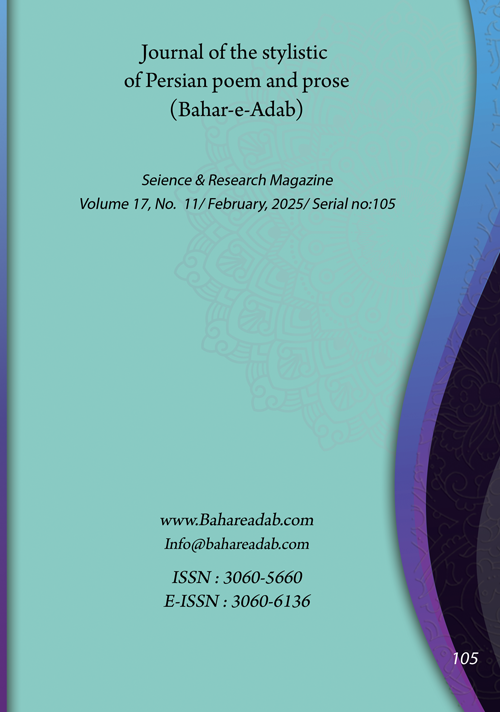- Count View : 373
- آدرس کوتاه شده مقاله: https://bahareadab.com/article_id/1763
- کد DOI مقاله: DOI:10.22034/bahareadab.2025 .17 .7613
Journal of the stylistic of Persian poem and prose
volume Number 17،
number In Volume 11،
،
issue Number 105
Introduction of Mirza Mohammad Sail Akhbari and a look at his manuscripts and poetry style
Maryam Jalalvand , Zahra Ghoroghi (Author in Charge), Gholamreza Davoudipour
Abstract
BACKGROUND AND OBJECTIVES: Manuscripts of written heritage are from the heart of the history and civilization of nations and are of great importance because they introduce us to the culture and thought of the past. Through manuscripts, one can understand the history, thoughts and opinions of people of different ages. Examining the content and structure of manuscripts in any period and field can be an effective help in knowing the style, influential factors, knowing and promoting the scientific, cultural and intellectual achievements of different ages. One of these lasting written legacies is the manuscript of Mirza Mohammad Sil Akhbari"s collection of poems by poets and writers of the 13th century Hijri during the Qajar period. He is a Shiite and has many praise poems in praise of Imam Athar (AS). He is also one of the famous figures in the Qajar sources and has expertise in many sciences and has written numerous books on jurisprudence, theology, and defending the teachings of the Akhbariyya and opposing the teachings of the Usulians, most of which have been published. But his poetry divan has been neglected, therefore the present study introduces the divan of Sil Akhbar poems which includes sonnets, masnavis, quatrains, pieces and other poetic forms, as well as introducing his thoughts and opinions, which are reflected in his poems and up to now. No one has corrected it and deals with the poetic aspects of Sil in the age and period he lived in.
METHODOLOGY: The research method in the preparation of this research is based on the manuscripts of this court that are available in the library of the Islamic Parliament and also other sources of the library, which will be in the form of content analysis.
FINDINGS: Examining Sil Akhbari"s poems and understanding his capabilities in using arrays and verbal and literary arts and his times, etc., clearly shows that Sil was very skilled in writing poetry, like other sciences, and in this way He has been a follower of literary traditions, especially eulogies.Along with all the poetic arts that he used, he paid more attention to the allusion art, which he used in an artistic way according to the needs of the present, the audience and the desired.
CONCLUSION: Seal wrote poetry in both Arabic and Persian languages, he was greatly influenced by the poets before him, including Hafez, and while benefiting from all kinds of arrays and allusions and literary tasks such as balance, respect for example, commitment, literalism, observation and sharing, from industry. He has taken a lot of hints and proved his power as a poet in this field. He has experimented in various poetic formats and has used mystical terms in his poems. The theme of his poems is mostly praise and romance. He did not pay attention to the world and material things and expressed this point in his poems.
Keyword
Stylistics
, manuscript
, Mirza Mohammad Sil Akhbari
, 13th century
, recognition of style
- A) Books
- The Holy Quran.
- Akhbari, Muhammad bin Abdul Nabi, 1232-1178 A.H.
- Akhbari, Mohammad, Safa Afwal Newspaper, Islamic Council Library
- Itzad al-Sultaneh, Ali Qalimirza, (1395), Elixir al-Tawarikh, revised by Jamshid Kianfar, Tehran, Asatir
- Akhbari, Mohammad, Dehkhoda Dictionary Institute and International Center for Persian Language Education
- Beheshti, Ebrahim (2019), Journalism of History and Beliefs, Qom, Dar al-Hadith Publishing and Publishing Organization
- Phaneshkar, Nusrat (1350), poetry style in the Qajar era, Tehran, Masoud Saad Mehr
- Tehrani, Agha Bozur (1403 A.H.), al-Dhariyyah to Sanaf al-Shia, Beirut, Dar al-Safra
- Samrah, Yadullah, (1364), Phonology of Persian Language, Tehran, Academic Publishing Center
- Hafez Shirazi, Shamsuddin Mohammad, (1369), Diwan Shamsuddin Hafez Shirazi, by Mohammad Qazvini and Qasim Ghani, Tehran, Zoar
- Hosseini, Maryam, (2008), Description of Hadiqa al-Haqiqah Sana'i, Al-Zahra University (S)
- Kazzazi, Mirjalaluddin, (2018), Khaqani reports, Tehran, Center
- Saadi Shirazi, Mosleh bin Abdullah, (1378), Bostan, corrected by Gholamhossein Yousefi, Tehran, Kharazmi
- Shafi kadkani, Mohammad Reza, (1372), Imagination in Persian poetry, Tehran, Aghaz
- shafi kadkani, M.(1368), poetry music, Tehran, Aghaz
- Shafi kadkani, M.(2008), Poet of Mirrors, Tehran, Aghaz
- Shamisa, Siros, (1374), familiarity with prosody and rhyme, Tehran, Ferdous.
- shamisa,S.(2012), poetry stylistics, Tehran, Farodes
- shamisa,S.(2011), Payam Noor University, Badieh, Tehran
- Sadraei Khoei, Ali, (1377), list of manuscripts of the Islamic Council Library, Tehran, Islamic Propaganda Publishing Center.
- Gholamrezaei, Mohammad, (2008), Persian poetry stylistics from Rudaki to Shamlu, Tehran, Jami.
- Qajar, Fath Ali Shah, (1370), Court of Fath Ali Shah Qajar, edited by Hassan Golmohammadi, Tehran, Atlas.
- Lasan al-Mulk Sepehr, Mohammad Taghi, (1377), Naskh al-Tawarikh, revised by Jamshid Kianfar, Tehran, Asatir.
- Dehkhoda, Ali Akbar, (1377), Dictionary, Tehran, University of Tehran.
- Mofatih al-Jannan.
- Mousavi Khansari, Mohammad Baqer, (1390), Ruzat al-Janat fi Akhwal Ulama wa Al-Sadat, Qom, Ismailian.
- Natal Khanleri, Parviz, (2004), Poetry and Art, Tehran.
- Hajwiri, Ali bin Othman, (1400), Kashf Al-Mahjub, Tehran, Soroush.
- b) Manuscripts
- Akhbari, Mirza Mohammad, Diwan Sil, manuscript number 13497, Islamic Parliament Library.
- Akhbari, Mirza Mohammad, Diwan Sil, version number 13648, Islamic Parliament Library.
- Akhbari, Mirza Mohammad, version number 21/13569, Islamic Council Library.
- Akhbari, Mirza Mohammad, manuscript number 14543, Rijal book, Islamic Parliament Library

